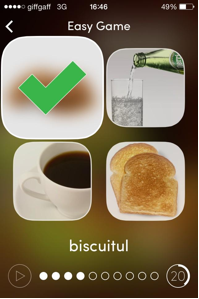My uTalk Romanian journey so far
Having a look at the uTalk challenge scoreboard in the EuroTalk office, it looks like I’m some way behind with my Romanian learning. But I haven’t give up yet! Here’s what I’ve learned so far about this language.
1. It’s a lot like Italian
This is very helpful for me, as I already understand a reasonable amount of Italian (even if it’s only from watching too many episodes of Inspector Montalbano…), so words like ‘la rivedere’ (goodbye, like the Italian arrivederci), ‘buna seara’ (good evening, like buona sera in Italian) and many colours and adjectives are very similar (‘urata’, ugly, sounds like the Italian word brutta, and many others like ‘plin’/pieno, ‘trist’/triste, ‘rapid’/rapido, ‘negrul’/nero or ‘verdele’/verde). Numbers are also very close to those in Spanish or Italian.
2. Sometimes you can make words just by adding ‘ul’ to the end
Ioana helpfully informs me that this is just the masculine ‘the’ (the feminine is ‘le’), but it still seems like a reliable strategy to guess words. After words such as ‘trenul’, ‘aeroportul’, ‘pasaportul’, ‘doctorul’ and my personal favourite ‘biscuitul’, I started guessing other words like ‘vinul’ (correct!) and ‘mapul’ (sadly incorrect), which occasionally works.
3. The speaking game is really fun and addictive, and probably the best way to learn
I don’t know about other people, but for me, producing the language is the key to remembering it. So, speaking or writing the language is key. Repeating the phrases and then using my own recordings to identify the pictures is weirdly fun and helps me to remember better than simple guessing of pictures in the easy or hard games, which encourage recognition but not reproduction. Of course the ultimate test is the recall game, where you have to remember and say the word or phrase yourself and then check it. These games can take a while to get 100% on, but are an excellent tool.
4. You have to learn to make some brand new sounds
Romanian has a few fun letters that we don’t have. ‘â’ (with a little hat) sounds like an ‘uh’, not an ‘a’ at all. So ‘Cât e ceasul?’ (what’s the time) isn’t pronounced how it looks to English speakers, but like ‘Cuht e chassul’, because the â is a different letter, and ce is a ‘ch’ sound like in Italian. It also has a funny ‘I’ which looks like this: î and sounds like another ‘uh’, which is difficult to describe. This sound is in words like ‘închis’ (closed) which sounds more like ‘unkees’. These sounds are pretty fun to pronounce if you ask me, and Ioana says I sound ok, which I put down to repeating after the native speakers in uTalk.
5. They invented crazy words for vegetables that make no sense!
Ok, maybe that’s a bit harsh, but my knowledge of French, Spanish, Italian, English and German can’t help me when it comes to learning the names of vegetables that have names like ‘bamele’, ‘ardeiul’, ‘porombul’ and ‘varza’, which don’t relate to any language I know. They can’t even call zucchini zucchini: it’s actually ‘dovleceii’.
Somehow I don’t think I’m going to beat Nat in the uTalk challenge, but I’m having fun with Romanian anyway!
Alex
(Editor’s note: it turns out nobody could beat Nat, who completed the challenge in Icelandic a couple of days ago. She’s now considering which language to learn next – any suggestions?)
Why I’m learning Romanian in January
In case Liz, Steve and Nat think we’re letting them have all the fun, I thought I’d chip in with my reasons for taking part in the EuroTalk New Year uTalk challenge!
I initially thought about learning Welsh, as I was born in Wales, so I thought it’d be a nice way to re-connect with my roots. However, having been informed that Welsh wasn’t added to uTalk yet (although it will be soon!), I ended up changing my mind, and decided on Romanian for my language.
So why did I choose Romanian? Well, I have to say the main reason is that I can try out my newly learned phrases on our reception superstar, Ioana! Everyone in the EuroTalk office knows that I like learning random words and phrases in their language and trying them out. I always like to greet Ioana with ‘noroc’ (cheers) if we have a drink together, but I thought perhaps I could manage a little better than that and at least add some basic conversational phrases to my repertoire.
Plus, I’m hoping that I can make a trip to Romania in the not too distant future, and would definitely like to be able to get around without embarrassing myself too much.

How about you? Which language will you be learning this new year?
Alex
Scire linguas: Why knowing your Latin can help your language skills
Thanks to London Translations for today’s blog post about the value of learning Latin!
Latin, a language that is more than 2,000 years old and is still spoken in the Vatican today, has shaped modern European languages like no other. Who would’ve thought that this medium of communication, which spread through the power of the Roman Empire, would influence language as we know it, speak it and understand it worldwide?
But why bother with learning Latin? If you don’t want to work in the Vatican, why should you learn a dead language? Surely you might as well focus on learning a modern language that actually helps you to communicate with other human beings, whether you’re travelling the world, writing emails or letters, or having business meetings with international clients.
However, despite being so old, Latin can give your language skills a real boost and help with a range of tasks, including consecutive interpreting. Why? Let’s take a closer look.
Better vocabulary
It’s a fact that almost 50 per cent of English vocabulary comes from Latin and 20 per cent from Greek. So if you know your Latin, you can derive an array of English words and improve your vocabulary in general. This applies to other European languages as well.
Better grammar
By getting to grips with Latin grammar, you can gain a better understanding of what grammar is about and how to apply that knowledge to other languages, making it easier to identify grammatical differences in a variety of languages.
Better learning of modern languages
If you know your Latin, it will be easy for you to apply your grammar and vocabulary skills to the modern Romance languages, such as Spanish, French, Portuguese and Italian. In fact, around 40 languages are connected to Latin. That is a big pool of knowledge.
Better performance in tests
People who know Latin generally outperform people who don’t in standardised tests. This may be because a language that has so many rules can help to shape logical thinking and cognitive skills in general.
Better foundation for different career paths
Knowing Latin and Greek can help to enhance your chances of succeeding in different career paths. In some professions, it is especially beneficial. Think of medicine, the law and philosophy.
As you can see, learning Latin has numerous advantages. It is not only a language for old, sophisticated men who sit in libraries all day. It is a language we should not forget and something that is well worth teaching future generations.
(In case you wondered what ‘scire linguas’ means, it translates as ‘learn languages’.)
If you’d like to try out a bit of Latin, you can find a free demo on our website.
Are you a language geek?
We’re proud to be language geeks here at EuroTalk, but we know we’re not the only ones! Here’s your opportunity to show us what you know… Can you get 100%? And more importantly, can you beat your friends? 😉
(By the way, if you want to cheat on any of the questions, the words we’ve used in the quiz are in our uTalk app – now available in 100 languages on iPad, iPhone and iPod touch.)
What language does the voice in your head speak?
In today’s day and age, a great percent of the people travel, either for vacations, business or even a longer period of time, in search of a better job, better opportunities, to be with the loved ones and why not, just for the sake of a multi-cultural experience. While some of us learn a new language as a hobby or in school, migrants find that it is difficult to live in a country whose language you can’t speak. So this is where we get to the point of this article: how does it feel to speak another language than your native one, every day with everyone.
 First of all, let me take you on a history trip back in the ‘90s. No, we’re not going to listen to Backstreet Boys, instead I’m going to tell you how our generation got to learn English from TV back in Romania. There was a single cartoon program back then, Cartoon Network, and it wasn’t dubbed in Romanian (like it is now), nor did we have subtitles. So we’d just watch the cartoons without completely understanding what they were saying (not that there was much conversation, but still) and I would occasionally ask my parents what does this/that mean. From the age of eight we’d eventually start learning English in school, but by then it already sounded familiar and we would only add the grammar to the equation.
First of all, let me take you on a history trip back in the ‘90s. No, we’re not going to listen to Backstreet Boys, instead I’m going to tell you how our generation got to learn English from TV back in Romania. There was a single cartoon program back then, Cartoon Network, and it wasn’t dubbed in Romanian (like it is now), nor did we have subtitles. So we’d just watch the cartoons without completely understanding what they were saying (not that there was much conversation, but still) and I would occasionally ask my parents what does this/that mean. From the age of eight we’d eventually start learning English in school, but by then it already sounded familiar and we would only add the grammar to the equation.
Growing up, we had daily contact with American English from movies and music and by the time I finished high school I’d already got a certified advanced level.
So I was quite confident in my English; I got the chance to use it for both of the jobs I had in the years I worked in Romania, and I got along really well with the people I’d have to speak in English on the telephone or in meetings.
Last year, when I moved to London I was rather surprised to find that I couldn’t understand what these people were saying. I panicked at first but then I realised that no one is expecting me to be 100% fluent in English so I started asking questions or asking people to repeat so that I can understand properly. As I said, most of the English vocabulary I had was American, so I started picking up the differences like, ‘mug’ not ‘cup’, ‘biscuits’ not ‘cookies’ and ‘fringe’ not ‘bangs’.
At first I found it quite exhausting, and at the end of the day I wasn’t able to concentrate anymore or to use more complex words. With time, I got used to it and I started learning more and more words and expressions that I would afterwards try to use in conversations (like for example ‘I’m skint’, which means ‘I’m broke’). Also, in the first months here, I used to get nervous at the supermarket or whenever a unexpected conversation would start, fearing that I won’t find my words or that I wouldn’t remember certain things. With time, I started gaining more confidence and now, after ten months, I am easily able to have a conversation, express my feelings and ideas accurately and understand almost all what the other person is saying. I still have trouble understanding different English accents, and I would probably see myself stuck in a conversation about, let’s say, gardening tools – so certain topics with a specific word-pool.
You know how in your native language you can express your feelings and state of mind by the words you choose and by your tone of voice? Well, good luck doing that when you only know a single set of words for each thing. Also, studies have shown that sometimes people find that they can speak more freely in a non-native language because they don’t feel that the words ‘really’ belong to them, they’re not ‘their’ words.
But what happens when you spend more than half of the day speaking a different language? Your brain starts to associate certain situations, new situations that you didn’t have to deal with in your home-country, with a certain language – this is when you start to ‘think’ in another language. Some people associate this moment with the moment you start to feel like you belong to a certain culture, that your roots are starting to clench to the ground and now you’ve become (or at least moved closer to being) one of ‘them’.
So I’ve found myself in situations in which it was easier for me to express myself using an English word rather than a Romanian one, either because I found that it sounded better or because I couldn’t think of a proper translation.
It’s funny how the brain works sometimes – I got a call at work today from a business partner that also speaks native Romanian, so naturally I started talking to her in Romanian and found it very difficult to find the right words or to build the sentences without sounding stupid. I felt like I had to do a reverse-translation of what I would normally say in English.
At the end of the day, I can agree that using multiple languages really does wonders for your way of thinking and for the structure of your thoughts. Like Nelson Mandela once said, ‘If you talk to a man in a language he understands, it goes to his head. If you talk to him in his language, that goes to his heart.’
Ioana

